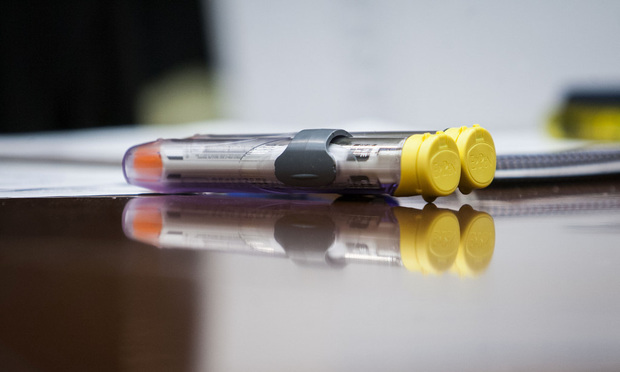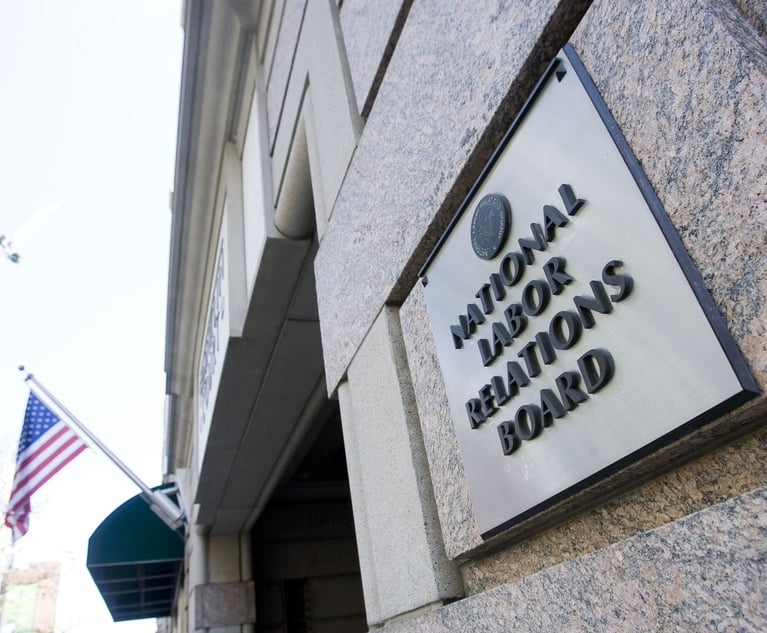Mylan Agrees to Pay $30M to Settle SEC Charges Connected With DOJ EpiPen Probe
Without admitting or denying the SEC's allegations, Mylan, headquartered in the Netherlands with U.S. operations based in Canonsburg, Pennsylvania, agreed to the entry of a final judgment ordering a $30 million penalty and permanently enjoining it from violating sections of the Securities Act of 1933 and Securitiies Exchange Act of 1934.
September 27, 2019 at 01:31 PM
4 minute read
 An EpiPen set during a House Oversight Committee hearing on Capitol Hill addressing the price increase of the company's EpiPen product. Photo: Diego M. Radzinschi/ALM
An EpiPen set during a House Oversight Committee hearing on Capitol Hill addressing the price increase of the company's EpiPen product. Photo: Diego M. Radzinschi/ALM
Mylan NV, manufacturer of the lifesaving allergy medication EpiPen, has agreed to pay $30 million in fines to settle charges by the U.S. Securities and Exchange Commission that the company misled investors by making false accounting statements and disclosures about a Justice Department probe into whether the company had overcharged Medicaid by hundreds of millions of dollars, the SEC announced Friday.
Without admitting or denying the SEC's allegations, Mylan, headquartered in the Netherlands with U.S. operations based in Canonsburg, Pennsylvania, agreed to the entry of a final judgment ordering a $30 million penalty and permanently enjoining it from violating sections of the Securities Act of 1933 and Securities Exchange Act of 1934.
"Mylan believes at this time, taking all other matters into consideration, that this settlement is the right course of action for the Company. The Company continues to be committed to the highest levels of integrity with respect to all aspects of its business operations, including its public filing disclosures and communications with investors," the company said in a statement Friday.
In its complaint filed in federal district court in Washington, D.C., the SEC alleged that Mylan had misclassified EpiPen, its most profitable product, which treats anaphylactic shock, as a generic drug under the Medicaid Drug Rebate Program instead of as a branded drug, resulting in much lower rebates to the federal government. According to the complaint, the company had raised the price of the drug more than 500% during the period during which the company was misclassifying it as generic, but failed to pay the additional rebates to the federal government.
The complaint alleges that in October 2014 the Centers for Medicare and Medicaid Services informed Mylan that EpiPen was misclassified, and that starting the following month and for nearly two years after, the Justice Department conducted a civil probe into the matter. During the investigation, the DOJ issued multiple subpoenas and demands, and rejected Mylan's attempts to close the investigation. It also informed Mylan of its intent to sue if the company didn't make a settlement offer and the company produced documents to the department including potential damages calculations and settlement offers, according to the complaint.
But the SEC alleges in the complaint that Mylan failed to disclose or account for financial losses from the DOJ's investigation in its public filings until October 2016, when the company finally announced a $465 million settlement with the DOJ.
As a result, the SEC charged that Mylan's public SEC filings for investors were false and misleading and that its 2014 and 2015 risk factor disclosures were inaccurate because they stated that a government authority "may" take a contrary position on its Medicaid submissions, when in fact the CMS had already informed the company that EpiPen was misclassified.
Antonia Chion, associate director in the SEC's division of enforcement said in a statement: "As alleged in our complaint, investors were kept in the dark about Mylan's EpiPen misclassification and the potential loss Mylan faced as a result of the pending investigations into the misclassification. It is critical that public companies accurately disclose material business risks and timely disclose and account for loss contingencies that can materially affect their bottom line."
The SEC's investigation was conducted by Ian Dattner and Daniel Maher, under the supervision of Lisa Deitch, Peter Rosario and Antonia Chion.
Brian Roman is general counsel for Mylan, which did not respond to a request for comment. Mylan is represented by Debevoise & Plimpton, which also did not respond to a comment request.
Read More:
AG: Drugmaker Pays State $7M to Settle EpiPen Claims
Mylan to Pay $465 Million to Settle Claims It Owed Rebates to Medicaid
This content has been archived. It is available through our partners, LexisNexis® and Bloomberg Law.
To view this content, please continue to their sites.
Not a Lexis Subscriber?
Subscribe Now
Not a Bloomberg Law Subscriber?
Subscribe Now
NOT FOR REPRINT
© 2025 ALM Global, LLC, All Rights Reserved. Request academic re-use from www.copyright.com. All other uses, submit a request to [email protected]. For more information visit Asset & Logo Licensing.
You Might Like
View All

Trump Fires EEOC Commissioners, Kneecapping Democrat-Controlled Civil Rights Agency

Testing Legal Authority, Trump Fires NLRB Member, Leaving Panel Without Quorum
3 minute readTrending Stories
- 1Decision of the Day: Court Holds Accident with Post Driver Was 'Bizarre Occurrence,' Dismisses Action Brought Under Labor Law §240
- 2Judge Recommends Disbarment for Attorney Who Plotted to Hack Judge's Email, Phone
- 3Two Wilkinson Stekloff Associates Among Victims of DC Plane Crash
- 4Two More Victims Alleged in New Sean Combs Sex Trafficking Indictment
- 5Jackson Lewis Leaders Discuss Firm's Innovation Efforts, From Prompt-a-Thons to Gen AI Pilots
Who Got The Work
J. Brugh Lower of Gibbons has entered an appearance for industrial equipment supplier Devco Corporation in a pending trademark infringement lawsuit. The suit, accusing the defendant of selling knock-off Graco products, was filed Dec. 18 in New Jersey District Court by Rivkin Radler on behalf of Graco Inc. and Graco Minnesota. The case, assigned to U.S. District Judge Zahid N. Quraishi, is 3:24-cv-11294, Graco Inc. et al v. Devco Corporation.
Who Got The Work
Rebecca Maller-Stein and Kent A. Yalowitz of Arnold & Porter Kaye Scholer have entered their appearances for Hanaco Venture Capital and its executives, Lior Prosor and David Frankel, in a pending securities lawsuit. The action, filed on Dec. 24 in New York Southern District Court by Zell, Aron & Co. on behalf of Goldeneye Advisors, accuses the defendants of negligently and fraudulently managing the plaintiff's $1 million investment. The case, assigned to U.S. District Judge Vernon S. Broderick, is 1:24-cv-09918, Goldeneye Advisors, LLC v. Hanaco Venture Capital, Ltd. et al.
Who Got The Work
Attorneys from A&O Shearman has stepped in as defense counsel for Toronto-Dominion Bank and other defendants in a pending securities class action. The suit, filed Dec. 11 in New York Southern District Court by Bleichmar Fonti & Auld, accuses the defendants of concealing the bank's 'pervasive' deficiencies in regards to its compliance with the Bank Secrecy Act and the quality of its anti-money laundering controls. The case, assigned to U.S. District Judge Arun Subramanian, is 1:24-cv-09445, Gonzalez v. The Toronto-Dominion Bank et al.
Who Got The Work
Crown Castle International, a Pennsylvania company providing shared communications infrastructure, has turned to Luke D. Wolf of Gordon Rees Scully Mansukhani to fend off a pending breach-of-contract lawsuit. The court action, filed Nov. 25 in Michigan Eastern District Court by Hooper Hathaway PC on behalf of The Town Residences LLC, accuses Crown Castle of failing to transfer approximately $30,000 in utility payments from T-Mobile in breach of a roof-top lease and assignment agreement. The case, assigned to U.S. District Judge Susan K. Declercq, is 2:24-cv-13131, The Town Residences LLC v. T-Mobile US, Inc. et al.
Who Got The Work
Wilfred P. Coronato and Daniel M. Schwartz of McCarter & English have stepped in as defense counsel to Electrolux Home Products Inc. in a pending product liability lawsuit. The court action, filed Nov. 26 in New York Eastern District Court by Poulos Lopiccolo PC and Nagel Rice LLP on behalf of David Stern, alleges that the defendant's refrigerators’ drawers and shelving repeatedly break and fall apart within months after purchase. The case, assigned to U.S. District Judge Joan M. Azrack, is 2:24-cv-08204, Stern v. Electrolux Home Products, Inc.
Featured Firms
Law Offices of Gary Martin Hays & Associates, P.C.
(470) 294-1674
Law Offices of Mark E. Salomone
(857) 444-6468
Smith & Hassler
(713) 739-1250






